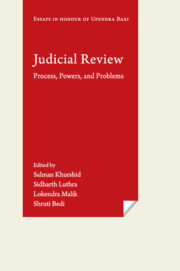Book contents
- Frontmatter
- Contents
- Foreword
- Editors' Note
- Introduction
- 1 The Inadequacy of Judicial Enforcement of Constitutional Rights Provisions to Rectify Economic Inequality, and the Inevitability of the Attempt
- 2 The Interplay of Law and Politics in India
- 3 Beating the Backlog: Reforms in Administration of Justice in India
- 4 Judicial Review: Perspectives and Reflections for the Twenty-First Century
- 5 When ‘Creeping Jurisdiction’ Goes Awry: The Social Action Litigation to Ban Surrogacy
- 6 Judicial Review and the Democratic Judge
- 7 Judicial Review: A Tool to Shape Constitutional Jurisprudence
- 8 The Baxian Bioscope on Indian Judicial Process
- 9 Judicial Activism, Courts, and Constitutional Revolutions: The Israeli Case
- 10 Democracy, Constitution, and Judicial Review: A Critique
- 11 A Minor Jurisprudence of Pathos: Upendra Baxi as Teacher and Writer
- 12 The Need for Reinventing the Supreme Court as a Constitutional Court
- 13 Appointment of ‘Distinguished Jurists’ as Judges in the Supreme Court of India: A Critical Analysis
- 14 Judicial Dissent and Judicial Review: A Functional Analysis
- 15 The Power of Judicial Review: Judicial Chutzpah or Judicial Desideratum
- 16 Judicial Review of Legislations by Tribunals in India: Law, Problems, and Perspectives
- 17 Criminalization of Membership of Terrorist Organizations in India and the United States of America: Human Rights Concerns
- 18 Article 142 of the Indian Constitution: On the Thin Line between Judicial Activism and Restraint
- 19 Sketching the Limits of Article 142 of the Constitution of India: A Constitutional Necessity
- 20 Constitutional Morality and Judges of the Supreme Court
- About the Contributors
- Index
9 - Judicial Activism, Courts, and Constitutional Revolutions: The Israeli Case
Published online by Cambridge University Press: 23 January 2020
- Frontmatter
- Contents
- Foreword
- Editors' Note
- Introduction
- 1 The Inadequacy of Judicial Enforcement of Constitutional Rights Provisions to Rectify Economic Inequality, and the Inevitability of the Attempt
- 2 The Interplay of Law and Politics in India
- 3 Beating the Backlog: Reforms in Administration of Justice in India
- 4 Judicial Review: Perspectives and Reflections for the Twenty-First Century
- 5 When ‘Creeping Jurisdiction’ Goes Awry: The Social Action Litigation to Ban Surrogacy
- 6 Judicial Review and the Democratic Judge
- 7 Judicial Review: A Tool to Shape Constitutional Jurisprudence
- 8 The Baxian Bioscope on Indian Judicial Process
- 9 Judicial Activism, Courts, and Constitutional Revolutions: The Israeli Case
- 10 Democracy, Constitution, and Judicial Review: A Critique
- 11 A Minor Jurisprudence of Pathos: Upendra Baxi as Teacher and Writer
- 12 The Need for Reinventing the Supreme Court as a Constitutional Court
- 13 Appointment of ‘Distinguished Jurists’ as Judges in the Supreme Court of India: A Critical Analysis
- 14 Judicial Dissent and Judicial Review: A Functional Analysis
- 15 The Power of Judicial Review: Judicial Chutzpah or Judicial Desideratum
- 16 Judicial Review of Legislations by Tribunals in India: Law, Problems, and Perspectives
- 17 Criminalization of Membership of Terrorist Organizations in India and the United States of America: Human Rights Concerns
- 18 Article 142 of the Indian Constitution: On the Thin Line between Judicial Activism and Restraint
- 19 Sketching the Limits of Article 142 of the Constitution of India: A Constitutional Necessity
- 20 Constitutional Morality and Judges of the Supreme Court
- About the Contributors
- Index
Summary
As a judge, I do not have a political platform nor am I a political person.… I do not aspire to power. I do not seek to rule. I am aware of the chains that bind me as a judge. I have repeatedly emphasized the rule of the law and not the rule of the judge. I am aware of the importance of the other branches of government-the legislative and executive. I view my office as a mission. Judging is not a job. It is a way of life. Whenever I enter the courtroom, I do so with the deep sense that, as I sit at trial, I stand on trial
—Aharon Barak[Legislation and adjudication] [i]n substance, they are political processes, involving exercise of power and authority through reason as well as fiat.… Judges ought to accept their political role. They also ought to accept that choices they make, from case to case, have substantive implications for design and direction of social transformation….’
—Upendra BaxiIntroduction
We are delighted to participate in this special festschrift in honour of Professor Upendra Baxi, whom we admire as a scholar and person of courage and principle. Having both explored, to varying degrees, the Indian Constitution, we appreciate the enormous contribution Baxi has made to the theory and practice of constitutional law, not only in India but also worldwide.
This volume focuses on the process, power, and problems of judicial review. The Indian judiciary is, of course, famous for its activist adjudication, or what Baxi refers to as ‘adjudicatory leadership’, which he believes is ‘a better notion than judicial activism’. Notable examples are the invention in the early 1970s of the ‘basic structure doctrine’ and the assertion of the power to conduct judicial review of constitutional amendments in order to safeguard the unamendable basic structure, or the democratization of access to justice through processes of social action litigation, which have promoted the disadvantaged and deprived classes—what Baxi termed ‘taking suffering seriously’. Baxi has eloquently described this activist story of the Indian judiciary and the court's role in social progress. This volume's focus on judicial power has led us to direct attention to another country—Israel—where the role of the Supreme Court in shaping the content of law and deciding political issues has greatly expanded in recent decades, a development largely attributable to the great activism exhibited by that court.
- Type
- Chapter
- Information
- Judicial Review , pp. 163 - 187Publisher: Cambridge University PressPrint publication year: 2020

